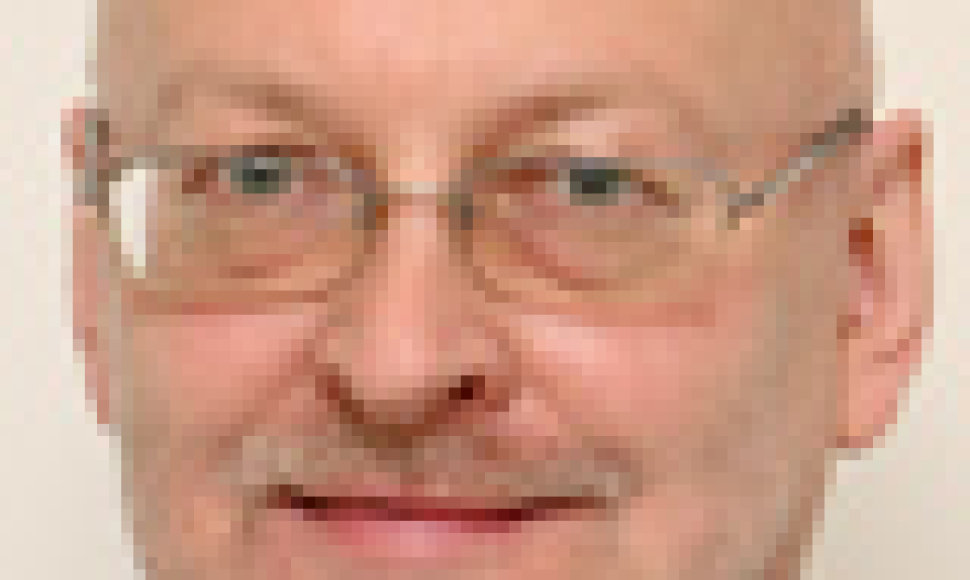All laymen and analysts of Scandinavian banks are ecstatic that Lithuania will continue to receive support from the EU for seven more years. And not peanuts – 44.5 billion litas. 1.5 billion to decommission a nuclear power plant. Farmers will be getting 675 litas for each hectare of their land, instead of the 490 litas they used to get.
Most important of all, we milked Brussels 4 billion litas more than we expected. One tenth! Extra money flows for the banks. Salaries to consultants. Extra “five percent” for politicians and bureaucrats.
Prosecutors, the SIS, and the FCIS are rewriting their plans and asking for extra funding. Since they'll need to do ten percent more of those spectacular arrests they're so good at. More of the small stuff, too, along the lines of the Labour Party or Nukem cases. More spots behind the crumbling bars and more cars to transport detainees from point A to point B and C.
Global Lithuania adepts will be able to give out not 500 loafs of black bread on London-bound planes, as they do now, but as many as 550. So that the nation does not forget the smell of Lithuania. And in order to maintain bread production levels in the face of contracting numbers of bread eaters.
This year, instead of the usual 7 science prizes, only six were given away. The Science Prize Commission simply couldn't come up with enough worthy candidates.
Everyone is optimistic about the future. But let's hold our horses and ask ourselves – how have we spent the money we got between 2004 and 2012? Have these EU billions – equal to two annul state budgets – been invested to generate new billions, reverse emigration, boost fertility rates? What good did they result in, besides our farmers becoming wealthier – a good thing in itself – and a new SBA furniture factory in Visaginas?
The EU money should be a good thing. And it does much good in some cases. And still, will this easy foreign money – spent on roads, training in political correctness, enormous rural tourism hotels, water purification, environmental protection, and meat processing plants, half of which have already gone under – not become a devil's centrifuge that will suck our last resources once the EU support stops and we are old as a nation?
Last year, water supply in a town as big as Tauragė became a loss-making business. Over the last 21 years, water consumption in Tauragė contracted 8 times. What will happen in 5-6 years, when the population goes down even more. And what will become of smaller settlements? Those that have invested millions into water purification?
Who is going to support the maintenance of these systems, if the country's population is under 2.5 million within two more decades – 2.5 million of much older people? Platinum heat and gold water for octogenarians? And forget about shale gas – only Russian gas and the more expensive the better.
Assimilating foreign money is one thing, investing it with sense is quite different. We'll think of something, the optimist then says, telling me to quit vilifying my country.
We will not think of something. There will be no one to do the thinking. This year, instead of the usual 7 science prizes (of 101.4 thousand litas each), only six were given away. Not for the sake of economy. The Science Prize Commission simply couldn't come up with enough worthy candidates. Even though projects from as long back as 1997 could apply for the seven prizes, there were only 18 nominees.
The most disturbing thing, though, is not the number of projects. It is the ratio. 8 projects were nominated for two prizes in humanities and social sciences. There were only three candidates for the two prizes in biomedical and agricultural sciences. And two for the technological prize, which was not awarded to anyone this year. Neither project was strong enough.
It is a sad fact that Lithuania has no more hard scientists. For too long a time, school pupils were opting for softer social sciences instead of physics, chemistry, biochemistry. And now we have the results.
It is pleasant indeed to hear about a yet another PhD awarded for a thesis proving a link between the one-second shorter hibernation of the Grūšlaukė Forest badger over the period of one hundred years and the global warming. And let's drink to the dissertation exploring interrelations between the Laumiai village, where a guy was caught driving with 5.08 permille of alcohol in his blood, a dog bark, and same-sex marriage legislation in the Seimas. But the truly relevant questions are the domain of other sciences.
But in this age of opportunity to wash dishes in London or nurse seniors in Chicago – who can be bothered to spend days at a microscope, counting protons or sheep Dolly cells?
Despite EU billions, Lithuania seems to be coming apart at the seams. Because we cannot find worthy national prize candidates not only in physical sciences, but even in literature, theatre, film. The burning fire of creation was replaced by central heating of EU support.













